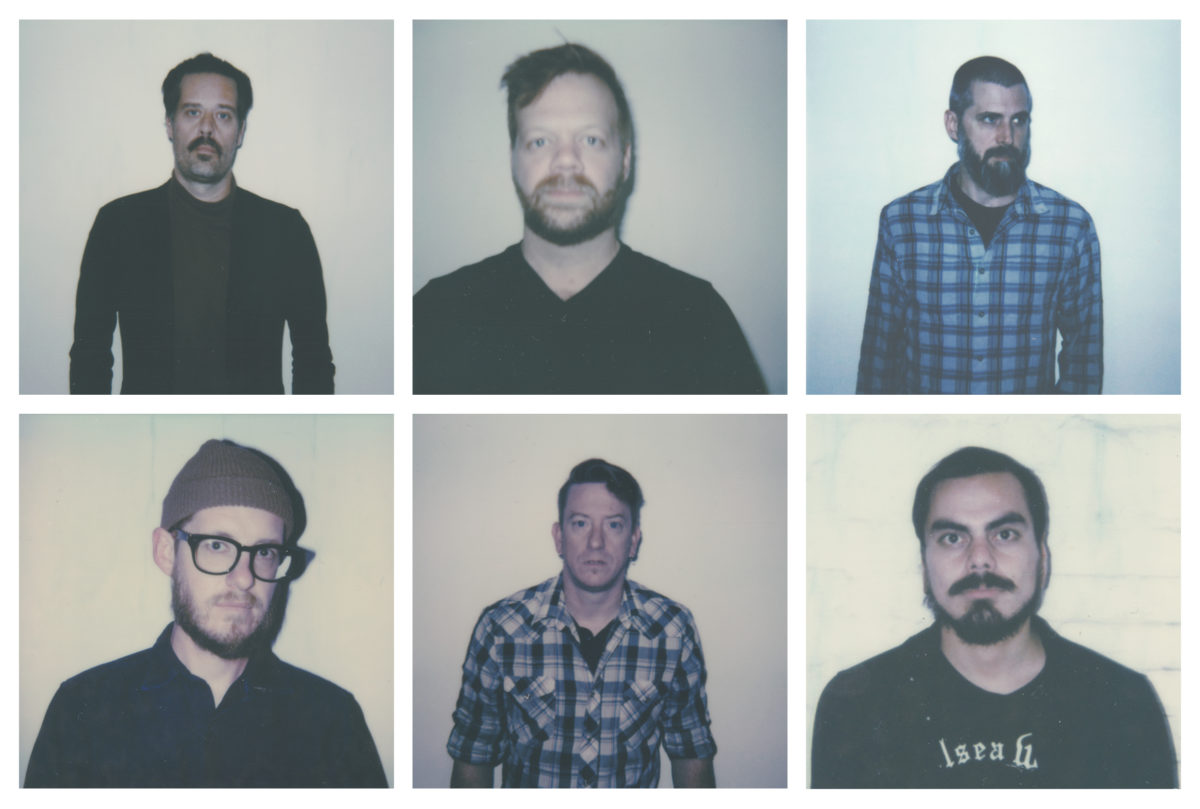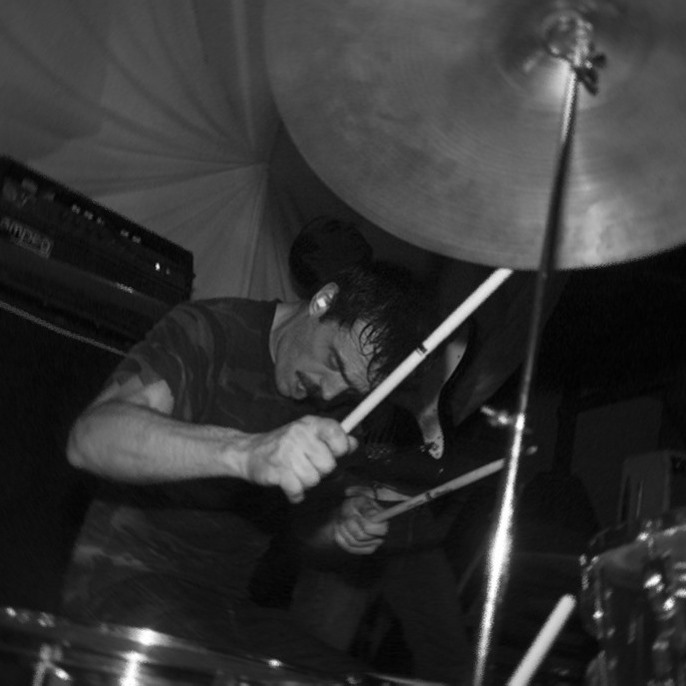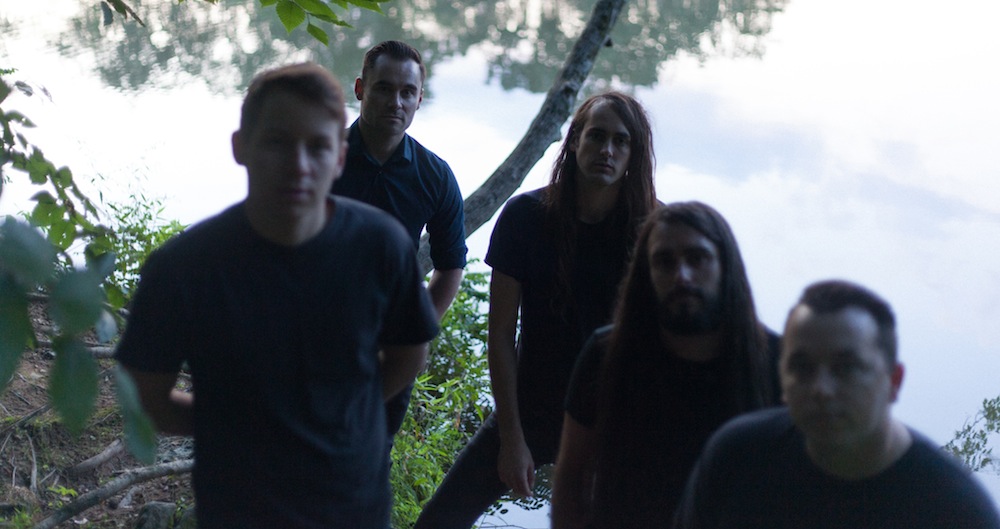Apr
08
with Maserati & Pianos Become the Teeth
Wed April 8th, 2020
8:30PM
Main Space
Minimum Age: 16+
Doors Open: 7:30PM
Show Time: 8:30PM
Event Ticket: $18
Day of Show: $20

Ticketing Policy
All ticket sales are final. No refunds or credits.
Caspian

Caspian Official Website | Caspian on Facebook | Caspian on Twitter | Caspian on Instagram
On their new full-length record, Dust & Disquiet, Caspian is saying something. “We’re wide awake now,” we hear in the album’s dead center, track five’s “Run Dry.” This isn’t the first time Caspian has sung a line of discernible lyrics, but the clarity-in the tone and thematic sentiment of both the track and the whole record-has never demanded so much attention.
In part, the line is a response to their last record, 2012’s presciently titled Waking Season-an acknowledgement that even they didn’t know what changes that waking process would mean. In the three years since, the band suffered the tragic death of founding bassist Chris Friedrich, and thus felt torn between grief’s desire to hide away from everything and yet knowing immediately that the band needed to continue. But going on meant maintaining a grueling tour schedule, with the members vacillating between elation and utter exhaustion. “Traveling can create a feeling of separation at times,” says guitarist and founding member Phil Jamieson. “After a while, you can forget why you’re out there in the first place. Deciding to do another record after all that was a move to reclaim for ourselves why it is that we do all this: Music is our strongest antidote to feelings of emptiness and disquiet.”
To record the album, Caspian returned to Q Division Studios in Somerville, Massachusetts, the stamping grounds where they recorded the highly acclaimed Waking Season (“the Best Post-Rock Album of Year,” said SPIN Magazine in 2012). They also looked again to the legendary chops of Matt Bayles (Mastodon, Isis, MONO, Minus the Bear) to produce, mix, and engineer the record.
2015 also marks a decade since the band’s inception. Ten years ago, Caspian played a show as a four-piece band at a small pub in their still-home base of Beverly, Massachusetts. After months of practicing before their first gig, never worrying about what it was they were trying to create beyond music that could tell a story, they arrived at a bombastic sound-guitars from Phil Jamieson and Cal Joss that sounded like a 40-piece orchestra, stripped-down drums that showed Joe Vickers could literally control chaos, and a bass sound so big from Chris Friedrich it blew amplifiers almost as often as he changed notes.
Their sound only deepened and thickened over the years with the addition of guitarists Erin Burke-Moran and Jonny Ashburn, and touring-cum-permanent bassist Jani Zubkovs.
With a sound this expansive, lyrics were simply unnecessary. And yet, 673 shows after their first appearance and on the advent of their fifth studio recording, Jamieson still says, “I view us as storytellers and musicians equally.”
That focus on narrative has continued across all of their albums, as otherwise the band would risk becoming a parody of themselves and the post-rock genre they’ve always acquiesced to with crossed fingers behind their backs. “We can do soundscapes, reverb-drenched drones, and songs based around a repeating melody that build and build for 12 minutes until we are blue in the face,” Jamieson says. “It is trying to convey a story through song structure, use of melody, and dynamics that has been the driving motivation from day one for this band.”
There has always been a fluidity to the arcs in Caspian records, where words like story and narrative held a loftier, mythic place in the movement to each album. We’re invited to enter and exit on our own terms, using the music as a railing to help us wander the dark hallways of our mind. The declarative title of You Are the Conductor (2005) announced that the music would take the listener on a journey, but where things went would be determined by the mood and circumstance of the listener. Each subsequent record refined and pushed the sounds into more surprising territory, showing the band’s ability to craft structures that the listener could inhabit-The Four Trees (2007) with its skyward glance, Tertia (2010) with its fists in the dirt, and Waking Season (2012) looking for the human in the machine. Raw emotion was always present, but it remained aloof, undefined. You felt it, but the feeling would dissipate just when you thought you could name what it was you were feeling.
But with Dust & Disquiet, the story has changed.
As much as grief wishes to be private, the passing of bassist Chris Friedrich left an indelible mark on the band, and it’s impossible not to see stark traces of this tragedy across the album. The whole of the record transcends their personal grief, but as Jamieson says, “It is and always will be, now, an underlying core to everything the band creates.”
They are forever marked by loss, but not defined by it.
As such, Dust & Disquiet showcases a maturation of the quiet/loud dynamic that Caspian has been exploring since their debut EP, You Are the Conductor. Now, that dynamic extends beyond a matter of volume, suggesting a more figurative exploration of polarities such as dark/light, dry/wet, and tired/awake. And these elements are not limited to one elongated track, but rather stretch out over an ambitious and yet patient album that opens with horns and a string quartet (“Separation No. 2”), riffs on the wilder, steel-eyed side of country (“Rioseco”) and classical (“Aeternum Vale”), all the while staying true to its epic brand of build-and-release rock (“Arcs of Command,” “Dust & Disquiet”).
On a first listen, then, a track like “Run Dry” might seem surprising for a band that, for the past ten years, has relied on their textured and explosive style of instrumental music to tell their story. And while this acoustic ballad is noticeable simply due to its unique sonic profile among the band’s catalog, there is a sobering quality that holds the listener in place. We are brought into their present moment, and we remain there indefinitely, even if the song only lasts less than five minutes. It may sound calm, but there is tension in the song’s desert air stillness. In the end, the track becomes a piece of an album that is the widest expression of the kind of connective work Caspian has been up to since the beginning.
It’s for this reason that the diversity of Dust & Disquiet-from the horns and string quartet that open and close the record to the primal honesty evident in tracks such as “Echo and Abyss” and “Darkfield”-bluntly assures they need no parlor tricks in order to keep their particular brand of instrumental music fresh. “The record has a genuine sincerity to it,” Jamieson says, “because we are still using the creative act as a weapon to combat feelings of emptiness and isolation. It is still a mechanism used toward connection to one’s self and to other people in an age of increasing separation.”
And that work is palpable throughout Dust & Disquiet. Images come into focus-the physical world and the world of imagination are one. Most of life is set up to break that connection, but Caspian is wide awake now, and they are expressly in the business of reconnecting.
Maserati

Maserati on Facebook | Maserati on Twitter | Maserati on Instagram
Pianos Become the Teeth

Pianos Become The Teeth are many things but they aren’t the type of band that are simple to describe. Correspondingly if the Baltimore, Maryland, based act exploded on the scene with their 2009 debut Old Pride and gained national attention with 2011’s The Lack Long After, their third album Keep You sees them taking a brave step forward to craft a musical statement that truly transcends genres. “There’s still the same amount of passion and energy inherent in this record, it’s just presented in a different way,” frontman Kyle Durfey explains—and that undying desire to push, challenge and redefine the band’s musical limits is what makes Keep You the type of record that grows more revealing to the listener with each listen.
Obviously the biggest difference between Keep You and Pianos Become The Teeth’s previous albums is Durfey’s approach, which sees him trading the throat-gutting screams of the band’s early releases with cleaner, more intelligible vocals. However anyone who has followed the band’s trajectory—specifically the song “Hiding” from their 2013 split with Touché Amoré—can trace the way the band’s sound has evolved from a melodic hardcore act to a group who create heaviness and weight via raw emotion instead of distortion “I took a less unbridled approach to the songs this time around,” Durfey explains. “That’s what I felt the songs called for and in my heart it matched the tone of the record.”
Pianos Become The Teeth—which also features guitarists Mike York and Chad McDonald, bassist Zac Sewell and drummer David Haik— began writing Keep You in 2012 while during a tour with Title Fight. When they got home the group took a writing expedition to a cabin owned by Sewell’s family in Taylors Island, Maryland, where they came up with the songs “Say Nothing” and “Lesions.” “We knew Kyle was planning on singing on this album so we wanted to be able to create something musically that would be beneficial for him to do that,” York says. “We paid attention to detail a lot with these songs but not in the same way that we had done in the past in the sense that instead of putting a bunch of cool parts together, we really tried to focus on the songs as a whole,” he adds.
In order to capture the band’s creative vision this time around they decided to work with producer Will Yip (Circa Survive, Braid) during a month long recording session in Conshohocken, Pennsylvania. “Will was just such a positive force to be around and he really helped us embrace what we were trying to do,” Durfey explains. “I definitely learned a lot about my own voice and gained a ton of confidence in the process.” York concurs adding, “Will knew what we were going for atmosphere wise; I realized we were making something that we loved but Will took that vision and made it more than we ever could have expected.”
Musically Keep You is an expansive statement that is defined almost as much by what the listener hears as it is the dramatic space that hangs between each note. For example, when Durfey sings “you can’t be everything you want to be before your time” on the cathartic, slow build “Late Lives” the same can be said of the fact that the band had to spend eight years playing together in order to get to the point where they could write music this layered and deliberate. “I love a song like ‘Late Lives’ because instead of a lead riff there’s intertwined riffs and David doesn’t even hit a snare drum until two-and-a-half minutes in,” York explains. “Alternately ‘April’ and ‘Old Jaw’ are more straightforward that anything we’ve ever done structure-wise but if you let yourself fall into the groove of the song you’ll appreciate it in ways that I don’t think have ever been possible with this band.”
That’s not to say that these songs don’t feature the virtuosic musicianship the band have built their name on, it’s just recontextualized into more moody and haunting compositions such as “Repine” which features atmospheric strings, an instantly contagious chorus and a tribal rhythm that solidly roots it. Lyrically Keep You deals with familiar concepts like mortality and communication in an intensely personal way that’s also remarkably relatable in its honesty. “If I had to boil down the overall theme of the album it’s about things you want to say to people but you can’t for some reason whether it’s because they’re not in your life anymore or they’ve passed away,” Durfey explains. “It still ties into our other records but it’s where I’m at now, which is still morose but not being completely destroyed by anything anymore.”
That inkling of hope is expressed when Durfey sings, “your wick won’t burn away” (“Repine”) or muses, “I say it all when I say nothing at all” (“Say Nothing”), conveying that memories live on after the physical bodies that embodied them have faded away. “I think it’s a musical growth not a departure,” Durfey summarizes when asked how he views the album. “We’re more proud of this album than anything we’ve ever done in the past,” adds York. “I’m just so excited to be able to share it with the people who have supported us for so long because I think it’s a really exciting next step for the band in every possible way.”
Pianos Become the Teeth
Pianos Become the Teeth on Facebook
Pianos Become the Teeth on Twitter
Pianos Become the Teeth on Instagram
Pianos Become the Teeth on Youtube

